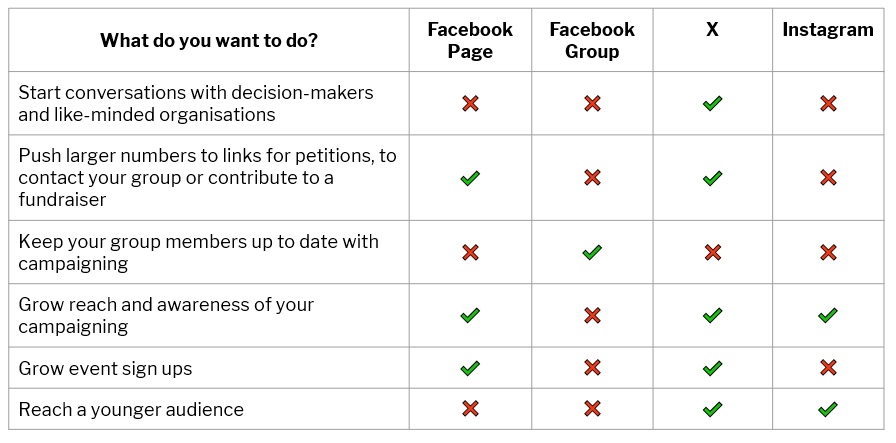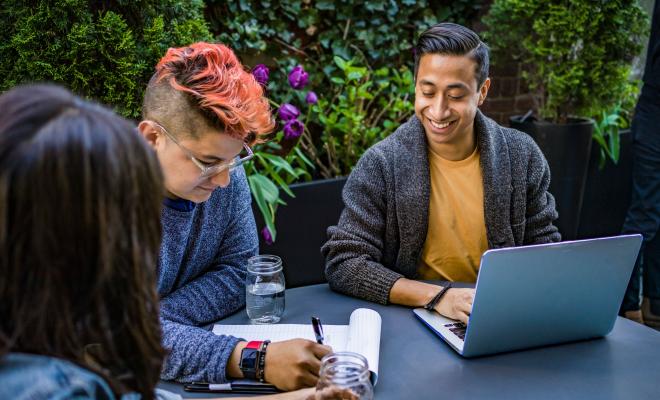03 Dec 2025
Social media lets you share information and interact with likeminded people. Using social media can help you:
- Reach people who might support or join your group.
- Spread awareness about your events, petitions and wins.
- Have a platform to lobby local decision makers.
- Connect with other groups and organisations in your community.
Which channel is right for you?
When used effectively social media can be a powerful ally. But every social media platform is different and each one takes time to look after. Before you set anything up, ask yourself what each platform has to offer and if you actually need to use it. You might be better off prioritising and not attempt to use them all.
We’ll cover the most popular platforms used by local action groups here. If you’d like advice on any others, please get in touch with us.
Facebook supports a wider range of content formats and offers a choice between 2 different things – a Group and a Page.
A Page acts like a mini-website where others can find out about your group. You can post news and updates and people can get in touch using Messenger or by posting themselves. If you want to use Facebook to promote your events and recruit more people to your group or campaign, then opt for a Page.
A Group is more of a forum or online space for people to engage with each other eg. to discuss issues with your members. Over time you can build a real sense of community and make your group a resource that people really value. But Groups can also be a lot of effort to maintain. You’ll need to play a guiding role by creating, monitoring and enforcing rules. You may also need to spend time moderating content to avoid spam or abusive posts. See our moderation tips for advice on this.
You can have both Page and Group, but me mindful that you’ll have more to look after.
Instagram focuses on just photo and video content. It emphasises sharing visuals and mobile phone use. Like other social platforms you interact with other users through likes, comments and messages.
X (formerly known as Twitter) is a microblogging site which aims to connect its users and let them share their thoughts with their followers. It can be a source of news, entertainment and discussion too. Posts have a character limit but can contain photos, videos and links as well as text.
Because X is a public forum used by politicians, journalists, business leaders and celebrities, it can a useful campaigning tool for your group.
We’ve heard concerns that X has seen a rise in fuelling far-right violence and hate speech since it was bought by Elon Musk bought X in 2022. If your group has an X account, we encourage you to do what’s right for your group – whether that’s to keep or remove it.
Alternatives to X
A range of similar platforms to X now exist, including Threads – created by Meta, the parent company of Facebook and Instagram – BlueSky and Mastodon. Whilst they don’t have the same number of users in the UK they can offer a quieter and friendlier alternative. Instagram can be a good for awareness raising but less successful if you’re trying to drive people to take action e.g. sign a petition.
The table below shows how content works well on different platforms.
Share the load
Looking after multiple social media channels can sometimes feel like a full time job. To make it easier your group should look at sharing the load across a small team, ideally 2-3 people. Here’s how you could split it up:
- Research and planning – map out event and campaign moments and plan when and where to post about them.
- Writing and scheduling content – create your posts and use scheduling tools to save time getting the word out
- Responding to people – reply to comments and queries
- Promotion and analysis – boost your content to widen your reach and analyse what’s working well on your channels.
Recruit a specialist
A common challenge for local action groups is not having the time or confidence to look after social media. If that’s the case for your group then why not recruit a volunteer to manage your channels?
There are plenty of people who want to find a way to use their skills for good but don’t know where to begin. You could be just what they’re looking for. Use your existing platforms – social media pages, email list and group contacts – to put the word out. You’re looking for people with:
- A background in running social media accounts
- Strong writing and communication skills
- An interest in the environmental movement.
Read this suggested advert to get you started.
Feed the algorithms
Social media platforms use a set of rules to dictate the content you see. These algorithms look at a range of factors to decide if something is relevant to show to people, who to show it to and how often. This means you’re very unlikely to see everything that you could see.
The algorithms get updated regularly but their basic premise is to learn from people’s behaviour. If people engage with your group’s social media content, they’ll be more likely to shown your content in the future. But if don’t post regularly or people don’t engage with you, they’ll be less likely to see your content in the future.
Each platform has its own algorithm.
Facebook prioritises content it thinks you’ll want to share with your friends. The most interesting conversation-starters get more reach; if a post has triggered a lot of conversation amongst your friends then you’ll see it more than once.
X is looking for the latest trends and news. Conversation is key, especially on trending topics. Posts with strong engagement with posts are given priority and higher visibility than posts which just broadcast information out into the ether.
Instagram rewards high-quality visuals. Like other platforms it shows you a mix of content you want to see and content it thinks you want to see. Consistency is key. Quantity of posts is less important.
Engagement metrics – such as likes, comments, and shares – greatly influence what appears in your feed. Newer content often gets priority to keep your feed fresh, but older content with consistent engagement can resurface.
Best practice
Here are our tops tips for using Facebook, X, Threads and Instagram.
- Be patient. Starting a new social media profile can be a learning curve. Some things will work, some won’t. Over time it’ll become clear what your audience responds to.
- Be positive. The climate crisis can sometimes be overwhelming. Balance your posts with some feel-good stories to help your followers connect positively with you.
- Post regularly. Play to the algorithms and aim for 3-5 times a week for Facebook and Instagram and at least once a day for X/ Threads. Social media companies like their platforms to be used. If you’re not posting regularly then your content will be shown to fewer people.
- Make your content shareable. Give your audience new or useful information that they will want to share with others. Sharing increases engagement and plays to the algorithms.
- Communicate with your audience. People feel valued when you take the time to reply to them. Reply to comments. Run polls, start conversations.
- Use clear language so your posts are easy for everyone to understand. Don’t forget to check your spelling and grammar.
- Make use of #hashtags. Hashtags are a good way to get your content in front of more people but stick to a maximum of 3 per post. And don't include more than 1 link per post.
- Social media is a very public space. Avoid sharing sensitive or revealing information.
- Use the pin feature. Pin your post to the top of your profile to draw attention to your most important message.
- Don’t make it all about yourself. Follow or like other users and share their news stories and updates. Look for local people, news outlets, businesses, organisations and decision-makers to get started.
Stay impartial
Your group needs to remain politically impartial on social media. Doing so means you can speak out with integrity when politicians do the right thing, and when they don’t.
Elections are an important time to talk about environmental issues – whether it's a local or general election. But you mustn’t endorse any political parties and you need to be fair and apply the same standard to different parties. Allies for environmental justice can come from all sides of the political spectrum.
Please read our political impartiality guidance for more.
How to structure a good post
Social media channels can be very fluid and conversational, so there isn’t a one-size fits all approach to structuring your posts. But here’s a useful framework to use if you’re just starting out writing content.
- Start with a question or bold statement – intrigue, encourage, question.
- Give more detail or insight – what expertise can you bring?
- Push to action - ie, a question, a link, a share. Make it clear.
- Be relevant and timely.
- Make sure your visual is necessary and adds something.
Audio visual content
Social media content with an image or video is much more likely to get attention. Our brains respond quickly to images and colour compared to other types of information – when people don’t have time to read a lot.
A photo, graphic or video can sometimes tell a better story than the written word. Here are our top tips to help you out:
- Use a variety of images to keep your audience’s attention.
- Use relevant and engaging images that add something to your content. Photos and videos of people in action work well.
- Take your own using our guide for good photos and videos.
- Use our photo library. We may be able to help.
- Find free stock images at Pixabay, Pexels and Unsplash.
- Check out Canva if you’re looking to design something. There are lots of guides to help you.
- Explore artificial image generation using platforms like Bing, Firefly and Canva. Be sure to say when you’re using AI generated images.
Save time and schedule
Plotting and scheduling your social media content in advance can help you:
- Save time. Automating your content creation can free you up to focus on other aspects e.g. reviewing performance
- Stay consistent and reduce the risk of mistakes
- Plan for key moments and keep your content timely and relevant
- Reach your audience at the best times.
A social media calendar – with an overview of upcoming posts organised by date and time – can be a great investment. Choose the format that works best you for. We've included some suggestions below if you're stuck.
Scheduling tools include:
- Meta Business Suite for Facebook Instagram
- Buffer
Here are some tips to help you plan your social media content:
- Themed weeks or months. Use a theme to plan content over a period of time. Tie it to related external events wherever possible, so your posts feel relevant and timely.
- Repeat yourself. People generally need to see something more than once before acting. Don’t be afraid to say the same thing more than once. You can always different words or images to avoid it feeling too repetitious.
- Tell personal stories. Social media is all about the human connection. Try and sell your story with emotion, not just facts and statistics. Using the people and voices within your group to tell a tale will resonate more deeply with your audience.
Stay in control
Make sure at least 2 people have access to each of your social media channels at all times. You need to maintain admin access because getting back in can be tricky once you’re locked out. You should also update passwords when people step down or move on from your group. Get in touch if you are locked out, we might be able to help.
It’s also worth looking at additional security measures – like 2-factor authentication. This can sometimes cause headaches where you have shared access but it will protect your accounts from unauthorized intruders.
Be mindful of attempts to hack into your social media accounts. A common scam on Facebook is a direct message telling you your page will be disabled. Here's an example:
If you think something doesn't look quite right, don't click on the link. Social media companies generally won't use direct messages to communicate with you if there's a problem.
Boost your Facebook posts
Take the performance of your social media up a notch with advertising. Paid social helps you get your content in front of more people, so they can engage with it and take action. We suggest using Facebook over X or Instagram because it’s typically much cheaper and has more effective targeting options.
You can create paid ads, which use variations of text and images and more detailed targeting. But a time-saving and simple alternative for your group is to "boost" an existing post. You’ll need to go through a verification process before you can start but putting a little bit of money behind a post can make a big difference.
Analyse your performance
It's good practice to see what’s working for your channel and what can be changed. It’s really worth spending some time analysing how your content performs. You’ll identify which posts generate the most interactions and can be emulated in the future. And learn from the ones which don’t do as well. Can they be adjusted to improve results next time?
Social media platforms will generally show you the following metrics
- Impressions – the number of times your post has been seen
- Reach – the number of people your post has been seen by
- Engagements – the total number of Likes, Comments, Shares
Engagements like comments or "reactions" are more valuable than Likes, as they take more time and usually show an emotional response eg, laughter. Shares are valued across all platforms. "Saves" on Instagram are also rated highly because it indicates good quality content that someone wants to return to it in future.
Further reading
This guide is designed to help you get started with social media. If you have any questions or want help with things not covered here please get in touch on [email protected].
Below are some suggested further reading if you want to dive deeper into social media.
- Glossary of common social media terms
- Find out more about how algorithms work
- How to Boost a Post on Social Media [Instagram, Facebook, and Twitter]
- Facebook for community groups
- Campaigning on Twitter
- Guide to using Twitter
- Alternatives to X
- How to Use Instagram: A Beginner's Guide
- What Is Instagram, and Why Should You Be Using It?










